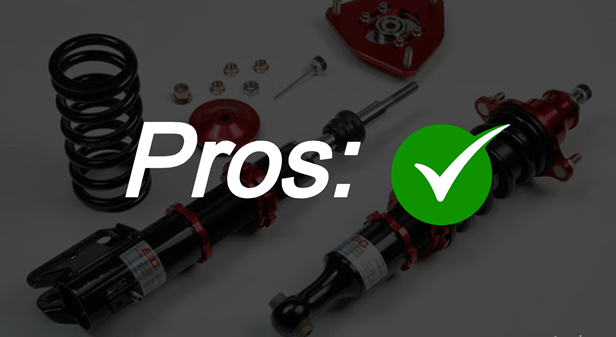When it comes to enhancing your vehicle’s performance and handling, few modifications rival the impact of coilovers. These adjustable suspension components offer improved ride quality, cornering stability, and vehicle/suspension aesthetics.
What are Coilovers?
Coilovers are a type of suspension system where the coil spring and shock absorber are combined into a single unit that offers you the ability to adjust various characteristics of your suspension. Offering adjustability in ride height, camber and damping characteristics. By allowing the user to fine tune various parameters, coilovers offer some of the best control over your vehicle’s handling and ride quality.
How to modify your suspension on a budget
Why You Should Install Coilovers

1. Customizable Performance:
One of the primary reasons enthusiasts opt for coilovers is the ability to tailor their vehicle’s suspension to their specific needs. Whether you’re aiming for a more aggressive stance, improved cornering agility, or enhanced setup for daily driving, coilovers provide the flexibility to achieve your desired suspension setup.
2. Enhanced Handling:
Coilovers allow for precise adjustments to damping rates, enabling drivers to optimize handling characteristics for different driving conditions. By fine tuning the suspension, you can minimize body roll, improve traction, and maintain better control during daily driving or track sessions.
3. Improved Aesthetics:
Beyond performance benefits, coilovers can also enhance the visual appeal of your vehicle. By lowering the ride height and eliminating wheel gap, coilovers give your car a more aggressive stance.
Ensure that you have all the other necessary modifications to support a lowered vehicle including things such as skid plates to keep your vehicle from retaining unnecessary damage.
4. Long-Term Savings:
Upfront coilovers can seem expensive, but as the timeless saying in the car community goes “by the expensive parts first” which means they can be a cost-effective investment in the long run minimizing the cost of having to replace cheaper suspension parts which would fail quickly. Coilovers can also mitigate excessive wear on other suspension components and tires through better alignment and damping control, coilovers can help prolong the lifespan of your vehicle’s chassis components when set up correctly.
Why You Shouldn’t Install Coilovers
1. Ride Comfort Sacrifice:
Lowering your vehicle’s ride height with coilovers may result in a stiffer, more unforgiving ride, especially on rough or poorly maintained roads. If comfort is a top priority for your daily commute, coilovers might not be the ideal suspension solution.
2. Increased Complexity:
While coilovers offer greater adjustability, they also introduce complexity into the suspension system. Setting up coilovers requires careful consideration of factors like ride height, spring rates, camber adjustment and damping settings, which may be daunting for novice enthusiasts or those without access to professional tuning assistance.
3. Potential Legal Issues:
Lowering your vehicle’s ride height beyond certain limits may interfere with local regulations, which could lead to legal issues. Before installing coilovers, it’s essential to research and understand the legality of modifications in your area to avoid legal repercussions.
4. Cost Considerations:
Quality coilover kits can be expensive, especially when factoring in installation costs and potential additional components like adjustable control arms or camber plates. For budget-conscious individuals, the initial investment required for coilovers may outweigh the perceived benefits.
How to modify your car on a budget
FAQ:
Can I install coilovers myself?
While some enthusiasts with mechanical aptitude may choose to install coilovers themselves, if you do not feel sure in your abilities it is advisable to seek professional assistance, especially for alignment setups and adjustments.
Will installing coilovers void my vehicle’s warranty?
It depends on the manufacturer and the terms of your warranty agreement. Some manufacturers may consider aftermarket suspension modifications like coilovers a void to certain aspects of the warranty, so it’s essential to research and understand your warranty coverage before proceeding.
Are coilovers okay for daily driving?
While coilovers offer adjustability to balance performance and comfort, significant lowering and aggressive spring rates may compromise ride quality, especially on rough roads. It’s crucial to find a setup that meets your comfort preferences while still offering the desired performance benefits.
Disclaimer
Consulting with automotive experts beforehand guarantees that any adjustments to your vehicle obey laws to avoid potential penalties or unnecessary repairs. Improper installation or misuse of coilovers can compromise safety and legality on public roads.
Conclusion
Should you install coilovers? The answer ultimately depends on your priorities, driving habits, and budget. While coilovers offer undeniable performance benefits and aesthetic appeal, they also come with potential drawbacks such as reduced ride comfort and increased complexity. By carefully weighing the pros and cons and considering factors like legal compliance and warranty interference, you can make an informed decision about whether coilovers are the right suspension upgrade for your vehicle.